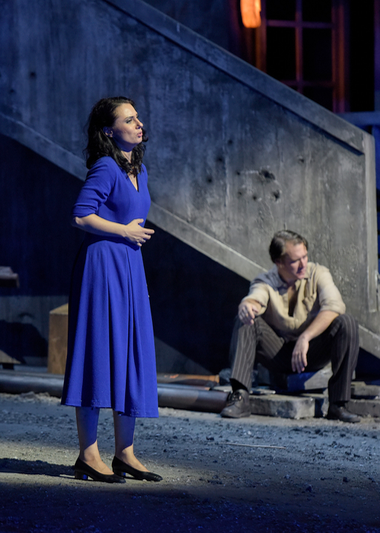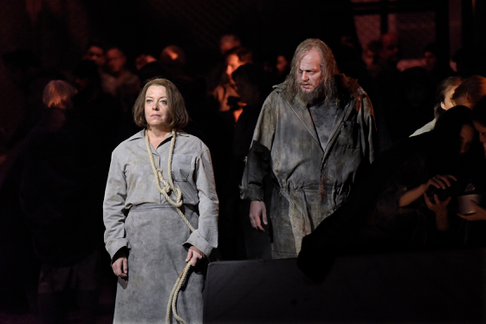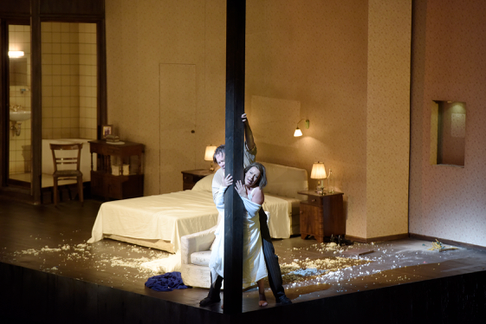
23 Aug 2017
Lady Macbeth of Mtsensk in Salzburg
The well-to-do merchant life of the opera’s small Russian town of Czarist times translocated to a monumental, socialistically heroic, concrete slum block.
English Touring Opera are delighted to announce a season of lyric monodramas to tour nationally from October to December. The season features music for solo singer and piano by Argento, Britten, Tippett and Shostakovich with a bold and inventive approach to making opera during social distancing.
This tenth of ten Live from London concerts was in fact a recorded live performance from California. It was no less enjoyable for that, and it was also uplifting to learn that this wasn’t in fact the ‘last’ LfL event that we will be able to enjoy, courtesy of VOCES8 and their fellow vocal ensembles (more below …).
Ever since Wigmore Hall announced their superb series of autumn concerts, all streamed live and available free of charge, I’d been looking forward to this song recital by Ian Bostridge and Imogen Cooper.
The Sixteen continues its exploration of Henry Purcell’s Welcome Songs for Charles II. As with Robert King’s pioneering Purcell series begun over thirty years ago for Hyperion, Harry Christophers is recording two Welcome Songs per disc.
Although Stile Antico’s programme article for their Live from London recital introduced their selection from the many treasures of the English Renaissance in the context of the theological debates and upheavals of the Tudor and Elizabethan years, their performance was more evocative of private chamber music than of public liturgy.
In February this year, Albanian soprano Ermonela Jaho made a highly lauded debut recital at Wigmore Hall - a concert which both celebrated Opera Rara’s 50th anniversary and honoured the career of the Italian soprano Rosina Storchio (1872-1945), the star of verismo who created the title roles in Leoncavallo’s La bohème and Zazà, Mascagni’s Lodoletta and Puccini’s Madama Butterfly.
Evidently, face masks don’t stifle appreciative “Bravo!”s. And, reducing audience numbers doesn’t lower the volume of such acclamations. For, the audience at Wigmore Hall gave soprano Elizabeth Llewellyn and pianist Simon Lepper a greatly deserved warm reception and hearty response following this lunchtime recital of late-Romantic song.
Collapsology. Or, perhaps we should use the French word ‘Collapsologie’ because this is a transdisciplinary idea pretty much advocated by a series of French theorists - and apparently, mostly French theorists. It in essence focuses on the imminent collapse of modern society and all its layers - a series of escalating crises on a global scale: environmental, economic, geopolitical, governmental; the list is extensive.
For this week’s Live from London vocal recital we moved from the home of VOCES8, St Anne and St Agnes in the City of London, to Kings Place, where The Sixteen - who have been associate artists at the venue for some time - presented a programme of music and words bound together by the theme of ‘reflection’.
'Such is your divine Disposation that both you excellently understand, and royally entertaine the Exercise of Musicke.’
Amongst an avalanche of new Mahler recordings appearing at the moment (Das Lied von der Erde seems to be the most favoured, with three) this 1991 Mahler Second from the 2nd Kassel MahlerFest is one of the more interesting releases.
‘And there was war in heaven: Michael and his angels fought against the dragon; and the dragon fought and his angels, And prevailed not; neither was their place found any more in heaven … that old serpent … Satan, which deceiveth the whole world: he was cast out into the earth, and his angels were cast out with him.’
If there is one myth, it seems believed by some people today, that probably needs shattering it is that post-war recordings or performances of Wagner operas were always of exceptional quality. This 1949 Hamburg Tristan und Isolde is one of those recordings - though quite who is to blame for its many problems takes quite some unearthing.
There was never any doubt that the fifth of the twelve Met Stars Live in Concert broadcasts was going to be a palpably intense and vivid event, as well as a musically stunning and theatrically enervating experience.
‘Love’ was the theme for this Live from London performance by Apollo5. Given the complexity and diversity of that human emotion, and Apollo5’s reputation for versatility and diverse repertoire, ranging from Renaissance choral music to jazz, from contemporary classical works to popular song, it was no surprise that their programme spanned 500 years and several musical styles.
The Academy of St Martin in the Fields have titled their autumn series of eight concerts - which are taking place at 5pm and 7.30pm on two Saturdays each month at their home venue in Trafalgar Square, and being filmed for streaming the following Thursday - ‘re:connect’.
The London Symphony Orchestra opened their Autumn 2020 season with a homage to Oliver Knussen, who died at the age of 66 in July 2018. The programme traced a national musical lineage through the twentieth century, from Britten to Knussen, on to Mark-Anthony Turnage, and entwining the LSO and Rattle too.
With the Live from London digital vocal festival entering the second half of the series, the festival’s host, VOCES8, returned to their home at St Annes and St Agnes in the City of London to present a sequence of ‘Choral Dances’ - vocal music inspired by dance, embracing diverse genres from the Renaissance madrigal to swing jazz.
Just a few unison string wriggles from the opening of Mozart’s overture to Le nozze di Figaro are enough to make any opera-lover perch on the edge of their seat, in excited anticipation of the drama in music to come, so there could be no other curtain-raiser for this Gala Concert at the Royal Opera House, the latest instalment from ‘their House’ to ‘our houses’.
"Before the ending of the day, creator of all things, we pray that, with your accustomed mercy, you may watch over us."

The well-to-do merchant life of the opera’s small Russian town of Czarist times translocated to a monumental, socialistically heroic, concrete slum block.
Though it really was not crumbling, decaying socialist housing, it was actually a vagina shaped cavity into which thrust two phallic platforms, in and out repeatedly throughout this long, loud, gross evening.
Shostakovich’s cheeky opera meant to impress Soviet authorities with politically correct attitudes backfired at its premiere, and Shostakovich was artistically sidelined for years. Just now stage director Andreas Kriegenberg’s extreme re-imagining of the piece in monumental uber-expressionistic terms, meant as well to be politically correct and impress the sophisticated Salzburg Festival audience, backfired as well.
Without comment on current, hackneyed socio-artistic platitudes let me simply attribute the misfortune that beset Herr Kriegenberg’s production to the common cold and attendant laryngitis. Heroically voiced soprano Nina Stemme, indisposed, sang but the first two of five performances. She was replaced for the remaining performances by the sweetly voiced rape victim of the opera's second scene, Russian mezzo soprano Evgenia Muraveva.
Make no mistake. Mlle. Muraveva is already a first-class Katerina Ismailowa. She is young and pretty and has a beautiful lyric voice, ideal for a straight forward take on life in czarist Russia by a young, sympathetic and erotically motivated Soviet composer.
But with cast concrete sets soaring 20 meters (60 ft) into the loft of the Grosses Festspielhaus, with two suspended phallic appendages charging in and out, with high powered character singers in all other roles, and with the super-charged Vienna Philharmonic in the pit this fine young artist was out of her depth.
Thus the production failed.
My suspicion is that Nina Stemme was the key to Herr Kriegenberg’s production. Mme. Stemme is not a simple woman. She is both Brünnhilde and Elektra, and she is well able to scale the heights of Herr Kriegenberg’s socialist Valhalla in all its putrid glory.
 Nina Stemme as Katerina, Stanislav Trofimov as the Pope
Nina Stemme as Katerina, Stanislav Trofimov as the Pope
And it was indeed putrid. Shostakovich’s opera is famously pornographic. Mr. Kriegenberg, abetted by conductor Mariss Jansons made sex as ugly as it could possibly be in scenes of anal penetration, colossal, collective humping. Not that there were not some light, kitsch touches. The arrested atheist who proclaims that frogs have souls was a Shostakovich look alike, the policemen effeminately cooked, wove and crocheted, the priest was dead drunk, etc.
 Nina Stemme as Katerina, Brandon Jovanovich as Sergey
Nina Stemme as Katerina, Brandon Jovanovich as Sergey
And further kitsch — there was sperm everywhere — flying feathers of pillows ripped apart, hundreds of little phallus sized cans of aerosol spewing thousands of tiny bubbles, bottles dispelling liquid through narrow necks. And so on.
I would have loved to have been offended and amused by such grossness. Overheard comments at the intermission noted that it was indeed an “extreme” production. And finally Mlle. Muraveva’s Lady Macbeth was greatly appreciated by audiences. But as it was I was disappointed that the Salzburg Festival did not respect Herr Kriegenberg’s production enough to find an appropriate replacement for Mme. Stemme.
Michael Milenski
Cast and production information:
Evgenia Muraveva: Katerina Lvovna Izmaylova; Dmitry Ulyanov: Boris Timofeyevich Izmaylov; Maxim Paster: Zinowy Borisovich Izmaylov; Brandon Jovanovich: Sergey;
Tatiana Kravtsova: Aksinya / Woman Convict; Andrei Popov: Shabby Peasant; Oleg Budaratskiy: Porter / Sentry; Igor Onishchenko; Millhand Vasily Efimov: Coachman / Teacher; Stanislav Trofimov: Pope; Alexey Shishlyaev: Chief of Police; Valentin Anikin: Policeman / Officer; Ksenia Dudnikova: Sonyetka; Andrii Goniukov: Old Convict; Gleb Peryazev: Manager; Martin Müller: First Worker; Oleg Zalytskiy: Second Worker / Drunken Guest; Ilya Kutyukin: Third Worker. Chorus of the Vienna Statsoper; Vienna Philharmonic. Mariss Jansons: Conductor; Andreas Kriegenburg: Director; Harald B. Thor: Sets; Tanja Hofmann: Costumes; Stefan Bolliger: Lighting; Christian Arseni: Dramaturgy. Grosses Festspielhaus, Salzburg Festival, Salzburg, August 21, 2017.